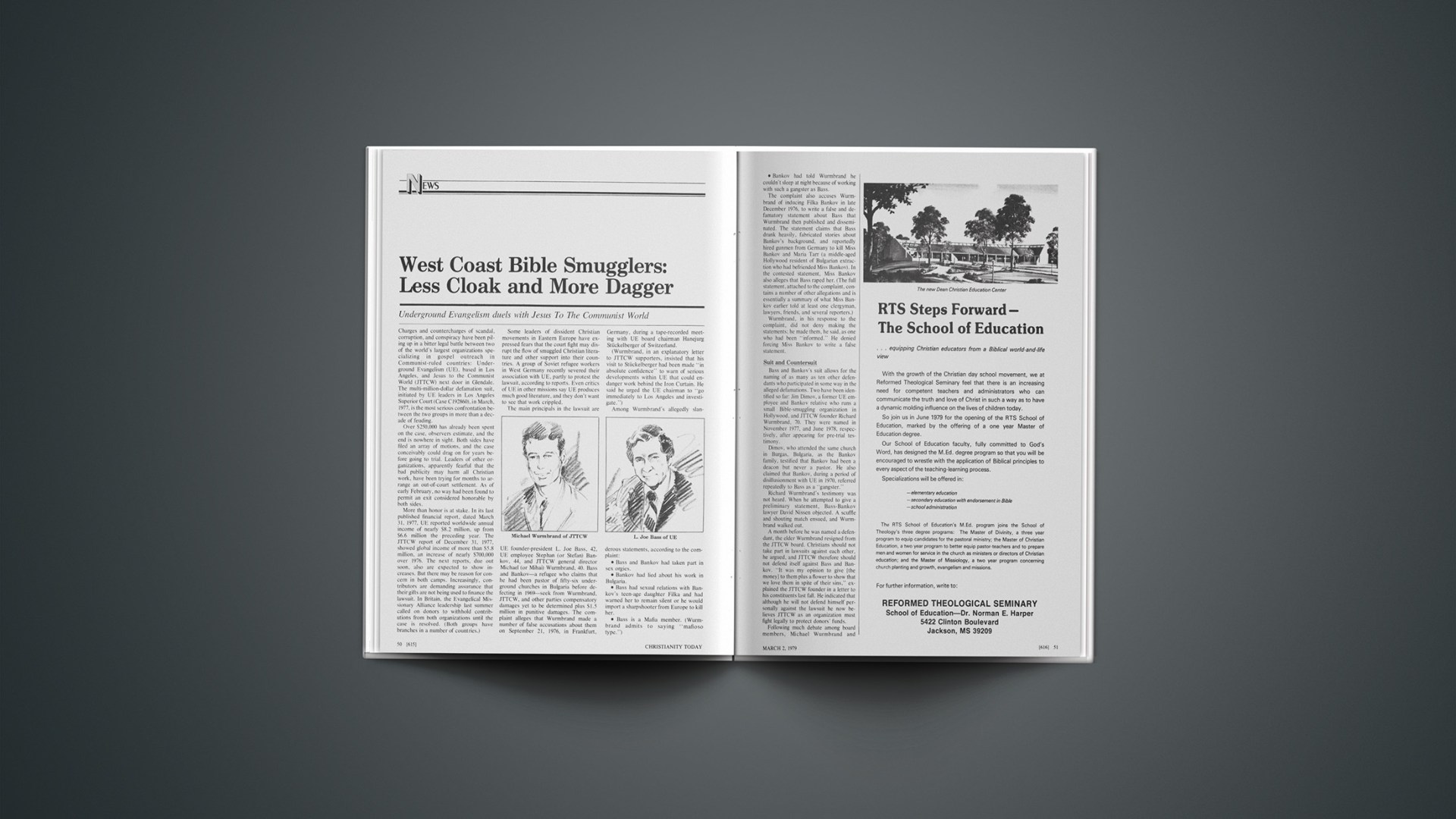Underground Evangelism duels with Jesus To The Communist World
Charges and countercharges of scandal, corruption, and conspiracy have been piling up in a bitter legal battle between two of the world’s largest organizations specializing in gospel outreach in Communist-ruled countries: Underground Evangelism (UE), based in Los Angeles, and Jesus to the Communist World (JTTCW) next door in Glendale. The multi-million-dollar defamation suit, initiated by UE leaders in Los Angeles Superior Court (Case C192860), in March, 1977, is the most serious confrontation between the two groups in more than a decade of feuding.
Over $250,000 has already been spent on the case, observers estimate, and the end is nowhere in sight. Both sides have filed an array of motions, and the case conceivably could drag on for years before going to trial. Leaders of other organizations, apparently fearful that the bad publicity may harm all Christian work, have been trying for months to arrange an out-of-court settlement. As of early February, no way had been found to permit an exit considered honorable by both sides.
More than honor is at stake. In its last published financial report, dated March 31, 1977, UE reported worldwide annual income of nearly $8.2 million, up from $6.6 million the preceding year. The JTTCW report of December 31, 1977, showed global income of more than $5.8 million, an increase of nearly $700,000 over 1976. The next reports, due out soon, also are expected to show increases. But there may be reason for concern in both camps. Increasingly, contributors are demanding assurance that their gifts are not being used to finance the lawsuit. In Britain, the Evangelical Missionary Alliance leadership last summer called on donors to withhold contributions from both organizations until the case is resolved. (Both groups have branches in a number of countries.)
Some leaders of dissident Christian movements in Eastern Europe have expressed fears that the court fight may disrupt the flow of smuggled Christian literature and other support into their countries. A group of Soviet refugee workers in West Germany recently severed their association with UE, partly to protest the lawsuit, according to reports. Even critics of UE in other missions say UE produces much good literature, and they don’t want to see that work crippled.
The main principals in the lawsuit are UE founder-president L. Joe Bass, 42, UE employee Stephan (or Stefan) Bankov, 44, and JTTCW general director Michael (or Mihai) Wurmbrand, 40. Bass and Bankov—a refugee who claims that he had been pastor of fifty-six underground churches in Bulgaria before defecting in 1969—seek from Wurmbrand, JTTCW, and other parties compensatory damages yet to be determined plus $1.5 million in punitive damages. The complaint alleges that Wurmbrand made a number of false accusations about them on September 21, 1976, in Frankfurt, Germany, during a tape-recorded meeting with UE board chairman Hanejurg Stückelberger of Switzerland.
(Wurmbrand, in an explanatory letter to JTTCW supporters, insisted that his visit to Stückelberger had been made “in absolute confidence” to warn of serious developments within UE that could endanger work behind the Iron Curtain. He said he urged the UE chairman to “go immediately to Los Angeles and investigate.”)
Among Wurmbrand’s allegedly slanderous statements, according to the complaint:
• Bass and Bankov had taken part in sex orgies.
• Bankov had lied about his work in Bulgaria.
• Bass had sexual relations with Bankov’s teen-age daughter Filka and had warned her to remain silent or he would import a sharpshooter from Europe to kill her.
• Bass is a Mafia member. (Wurmbrand admits to saying “mafioso type.”)
• Bankov had told Wurmbrand he couldn’t sleep at night because of working with such a gangster as Bass.
The complaint also accuses Wurmbrand of inducing Filka Bankov in late December 1976, to write a false and defamatory statement about Bass that Wurmbrand then published and disseminated. The statement claims that Bass drank heavily, fabricated stories about Bankov’s background, and reportedly hired gunmen from Germany to kill Miss Bankov and Maria Tarr (a middle-aged Hollywood resident of Bulgarian extraction who had befriended Miss Bankov). In the contested statement, Miss Bankov also alleges that Bass raped her. (The full statement, attached to the complaint, contains a number of other allegations and is essentially a summary of what Miss Bankov earlier told at least one clergyman, lawyers, friends, and several reporters.)
Wurmbrand, in his response to the complaint, did not deny making the statements; he made them, he said, as one who had been “informed.” He denied forcing Miss Bankov to write a false statement.










